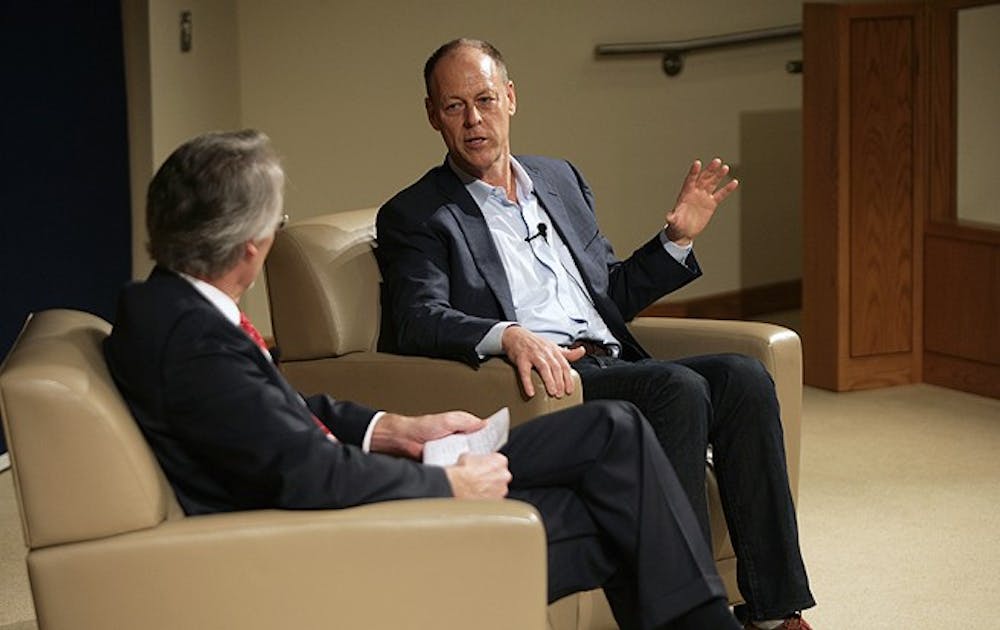If students want to change the world, they must discover what is most meaningful to them and follow that passion, Whole Foods co-CEO Walter Robb said at the Fuqua School of Business Tuesday afternoon.
Deeply interested in healthy food, Robb opened a health food store in California in 1976, after graduating from Stanford with a degree in history. Eventually, he joined Whole Foods as a manager, and in 2010 he became co-CEO alongside the company’s co-founder, John Mackey.
As part of Fuqua’s Distinguished Speakers Series, Robb discussed his leadership style and the social aspects of entrepreneurship in a question-and-answer format with Fuqua Dean Bill Boulding and then took audience questions. After several decades spent in the business world, Robb told more than 200 students and community members that he sees entrepreneurship as the “greatest possible change agent in the world.” That means looking beyond the shareholders’ bottom line to see what is best for all stakeholders, including a company’s workers, he added, noting that he, Mackey and three other executives cap their pay at 19 times that of an average Whole Foods worker, compared to a more typical arrangement where CEO pay might exceed that of the average worker by several hundred times.
“You guys all have the incredible advantage of an education at Duke,” Robb said. “What are you going to do with it?”
The Chronicle’s Gloria Lloyd sat down with Robb after his talk to discuss how students can make an impact on the world through entrepreneurship.
The Chronicle: In your talk, you encouraged students to “do the work inside yourself” to find what it is that drives them. But that may sound easier than it actually is, or students just may not have come across their passion yet. Do you have any advice on things students can do to find their passion?
Walter Robb: It starts with something as simple as listening to things that are inspiring to you—a painting, a book, a walk. Pay attention to those moments when you feel that passion. That’s the universe trying to get you to create your own path. And your job is to listen when that happens. The only answer is one you create for yourself. And you have to be open to those moments of inspiration and have the courage to stitch them together and find your own way. And ask yourself why it inspires you.
Sometimes I will take a walk on a beach and say my life out loud. When you put your life into words, you give strength to your thoughts and your moments that are most powerful or emotional and that can help you think about where you want to go.
I think your generation in particular has an inherent sense of the interconnectedness of the world. That’s something my generation took a long time to learn. You’re digital natives, so you get to start knowing that everyone is connected. So your starting place is further along than my generation’s was, and you have that advantage no matter what you want to do.
TC: Social entrepreneurship is really important at Fuqua and at Duke. Students take social entrepreneurship classes and many want to be social entrepreneurs. Should social entrepreneurship be separate from entrepreneurship?
WR: What’s different about what I’m trying to lay out here is that business is evolving, and the way in which that manifests itself socially may vary. Entrepreneurship in the 21st century has evolved to where it’s operating from a more responsible place.
I don’t like those separations of visions of entrepreneurship and social entrepreneurship. For example, some businesses have a “sustainability department.” What does that mean? Is it the only department that’s sustainable, and everything else is not? Sustainability should just be part of how you’re operating.
TC: You talked about how you believe business is the best tool available for social change. If someone wants to change food in America, why is it better to start a company like Whole Foods, rather than a nonprofit?
WR: At Whole Foods, we have a pretty big platform and a certain amount of weight that comes with being a company of our size. We also have a certain amount of responsibility to our customers, and there’s a big opportunity that goes along with that. Whole Foods can literally move mountains. We are big enough that we can raise issues, or change standards. And it’s our customers that give us that big platform. It’s a very different feeling from a nonprofit trying to change things.
Get The Chronicle straight to your inbox
Signup for our weekly newsletter. Cancel at any time.

